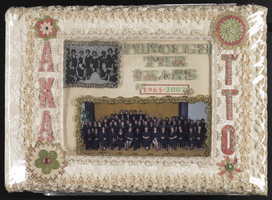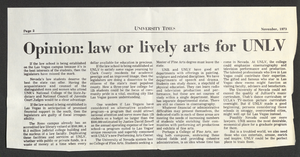Search the Special Collections and Archives Portal
Search Results

Transcript of interview with Daniel Kaminski by Brian Corcoran, March 14, 1978
Date
Archival Collection
Description
On March 14, 1978, Brian Corcoran interviewed Twenty-One dealer Daniel Kaminski (born November 17th, 1947 in New Jersey) about his life in Southern Nevada. The two discuss Kaminski’s occupational history and gambling practices amongst tourists. They then go in depth on the rise of gambling establishments across the United States and the impacts it may have on Las Vegas. The interview concludes with a discussion on the role of dealers in casinos.
Text

Transcript of interview with Walter Weiss by Claytee White, November 2, 2010
Date
Archival Collection
Description
In this interview, Walter Weiss discusses how Judaism and boxing kept him out of trouble in his youth. Weiss grew up in the Boston area, and started boxing as a teenager. Weiss talks about his boxing training, becoming a runner for a bookmaker, and coming to Las Vegas in the 1950s to be a bookmaker for the Stardust Hotel, and working the slot machine floor. He had several different jobs in various casinos, and discusses different people involved in the gaming industry in Las Vegas.
Walter Weiss life story begins in a Malden, Massachusetts during the Great Depression. His early background was a blend of observant Judaism, secularism, and the effects of the era. He was a troubled youth whose older brother encouraged him to join him in boxing. As Walter explains: I was a wild kid and ... boxing saved my life. His aptitude for boxing led him to be a sparring partner in New York City's famous Spillman Gym. There he met and worked out with some of the greatest fighters of the era, including Rocky Marciano. He recalls how he turned professional while attending the University of Miami and how he first came to Las Vegas in 1958 to escape his personal troubles and find work with a local bookmaker. Thus began his diverse employment history in the casino industry. He details his various positions and the cast of famous and infamous characters of the times. For six years he return to New York and worked as a Wall Street broker before arriving back in Las Vegas in 1973. He talks about his property ownership, lobbying for an amendment to Senate Bill 208, his personal religious changes and a sundry of observations about the changes that occurred as the state took over gaming.
Text

Transcript of interview with Ray Christian by Russell L. Ellis, March 19, 1978
Date
Archival Collection
Description
On March 19, 1978, Russell L. Ellis interviewed former postal worker, Ray Christian (born 1927 in Las Vegas, Nevada). The two discuss Ray’s family history and his experiences as a Black man in early Las Vegas. Ray Christian compares the experiences of his childhood with that of his children in Las Vegas. The interview concludes with Christian expressing how Las Vegas has grown and that there are more opportunities available for his children to pursue.
Text

Alpha Kappa Alpha Sorority, Theta Theta Omega Chapter scrapbook: "Through the years"
Date
Archival Collection
Description
From the Alpha Kappa Alpha Sorority, Incorporated, Theta Theta Omega Chapter Records (MS-01014).
Mixed Content

Transcript of interview with Florence McClure by Joanne Goodwin, January 24, 1996 & February 6, 1996
Date
Archival Collection
Description
Florence McClure came to Las Vegas later in her life, but the state felt her presence and the community her contributions as if she were a native daughter. Introduced to the League of Women Voters in 1967, McClure met her political mentor Jean Ford and learned how to practice the core elements of democracy. She put those tools to work in a number of ways, however her participation in the creation of the Rape Crises Center and her advocacy for locating the women’s prison near Las Vegas are two of her long-lasting efforts. Florence Alberta Schilling was born in southern Illinois where she enjoyed the security of a tight-knit family and the independence to test her abilities growing up. She graduated from high school and attended the MacMurray College for Women at Jacksonville. With the attack on Pearl Harbor in 1941, she began a series of jobs working for the war effort. She moved to Ypsilanti, Michigan with a girlfriend to work at the Willow Run Army Airbase and then moved to Miami, Florida where she worked for the Provost Marshall in the Security and Intelligence Division. She met her husband, James McClure, at the time and they married in 1945. During the next several years, they raised a family and moved around the country and to Japan with the military. McClure came to Las Vegas in 1966 as part of her work in the hotel industry which she engaged in after her husband’s retirement from the military. She had worked in California and Miami Beach, but it was Burton Cohen in Los Angeles who invited her to join him in a move to Las Vegas to build the new Frontier Hotel and Casino. Following the completion of the Frontier, she moved to the Desert Inn with Cohen in 1967 and worked as the executive office manager. After a few years, she decided to leave the industry and complete her college education. She graduated from UNLV in 1971with a BA in Sociology with an emphasis on criminology. She was 50 years old. McClure had been a member of the League of Women Voters for a few years at that point and had learned the political process from Jean Ford and workshops on lobbying. She had numerous skills that were waiting to be tapped when she attended an informational meeting on the incidence of rape in the Las Vegas valley. From that meeting, a small group of individuals, including McClure, began the organization Community Action Against Rape (later renamed the Rape Crisis Center) in 1973. It was the first agency in the area devoted to serving individuals who had been assaulted and changing the laws on rape. The organization’s first office was set up in McClure’s home. Over the next decade, she worked to change attitudes and reshape policy by constantly raising the issues of sexual assault with police officers, emergency room doctors, judges, and legislators. Her role as an advocate took her into hospital emergency rooms and courtrooms to assist victims. It also took her to the state legislator to lobby repeatedly for a change in laws. During this period, journalist Jan Seagrave gave McClure the nickname “Hurricane Florence” - a fitting moniker that captured the force with which McClure attacked the issue. As a result of her efforts and those of the people with whom she worked, we now 1) recognize rape as a crime of assault; 2) forbid the sexual history of a rape victim from being used against her in court; and 3) recognize marital rape. In addition to learning about Florence McClure’s activities, the reader of this interview will gain information on the role of civic organizations like the League of Women Voters in engaging the voluntary efforts of women in the post-war years.
Text

Andres Dominguez oral history interview: transcript
Date
Archival Collection
Description
Oral history interview with Andres Dominguez conducted by Marcela Rodriguez Campo, Laurents Bañuelos-Benitez, and Barbara Tabach on February 11, 2019 for the Latinx Voices of Southern Nevada Oral History Project. In this interview, Dominguez discusses his upbringing in Las Vegas, Nevada and growing up on the Eastside. He talks about the history of barbering in his family, and his path to becoming a barber. Dominguez describes the process of acquiring the barbershop at the El Cortez Hotel and Casino, and the significance of the location to his family. Lastly, Dominguez discusses his perspective on life, the importance of networking, and his decision in naming his shop Speakeasy Barbershop LV.
Text

Epilogue: UNLV Yearbook, 1970
Date
Description
Yearbook main highlights: schools and departments; detailed lists with names and headshots of faculty, administration and students; variety of photos from activities, festivals, campus life, and buildings; campus organizations such as sororities, fraternities and councils; beauty contest winners; college sports and featured athletes; and printed advertisements of local businesses; Institution name: University of Nevada, Las Vegas
Mixed Content

University of Nevada, Las Vegas law school establishment: correspondence, newspaper clippings, and reports
Date
Archival Collection
Description
Folder from the Jean Ford Papers (MS-00025) -- Political materials file.
Text

Eloiza B. Martinez oral history interview: transcript
Date
Archival Collection
Description
Oral history interview with Eloiza B. Martinez conducted by Maribel Estrada Calderón on October 10, 2018 for the Latinx Voices of Southern Nevada Oral History Project. Martinez discusses the career preparedness she took while working for Commercial Credit Corporation and studying with Mayor Oscar Goodman. She then describes her first impressions of Las Vegas, Nevada and about her community involvement. Martinez then discusses her work at Wells Fargo as loan officer and assistant vice president, and talks about discrimination in the workplace and in the neighborhood where she grew up.
Text

Andre King oral history interview: transcript
Date
Archival Collection
Description
Oral history interview with Andre "Brother Dre" King conducted by Claytee D. White on July 20, 2018 for the Remembering 1 October Oral History Project. In this interview, King recalls learning judo and wrestling at an early age. After spending ten years in prison for a burglary offense, he served an additional eleven years in facilities across the state. After twenty-one years in the system, King is now a nondenominational spiritual being and once he learned about the Healing Garden for 1 October victims, he went there daily, during and immediately after the construction. King has helped many survivors and has healed himself as well, through giving love, hugs, and spiritual inspiration.
Text
